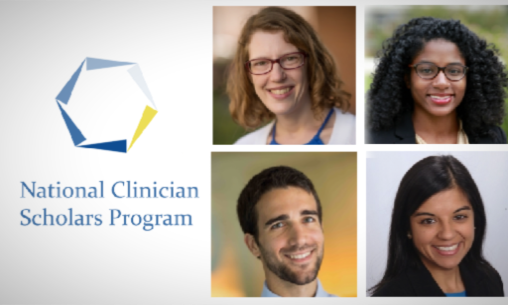
Last week we welcomed the inaugural cohort of the Duke National Clinician Scholars Program (NCSP). The four scholars – two postdoctoral nurses and two physicians – share a convenient location adjacent to our GIM division offices in downtown Durham where one of their program directors is GIM Professor of Medicine, Dr. Gene Oddone.
“We were excited to kick off the year with our inaugural cohort of NCSP Scholars," says Oddone. "The Scholars are all excited to get going on their classes and projects and the mentors and faculty are equally excited to make this year a great success."
Dean Marion Broome of the Duke School of Nursing and and Dr. Eliana Perrin of Pediatrics are also NCSP Program Directors and GIM Division Chief, Dr. Ebony Boulware, is Duke's Administrative Program Director for NCSP.
The NCSP grew out of the Robert Wood Johnson Foundation Clinical Scholars Program as a consortium of academic health care research centers providing training for these researchers as change agents for driving policy-relevant research and partnerships to improve health and health care. The Duke NCSP is a partnership between the Durham VA Health Care System and the Duke University schools of medicine and nursing.
Meet the Scholars:
 Sallie Allgood, PhD(c), RN - Examining how the integration of community health workers into primary care systems affects patients’ health outcomes and primary care utilization as well as population level health disparities and chronic disease risks.
Sallie Allgood, PhD(c), RN - Examining how the integration of community health workers into primary care systems affects patients’ health outcomes and primary care utilization as well as population level health disparities and chronic disease risks.
 Dominique Bulgin, PhD(c), RN - Investigating the influence of stigma on sickle cell disease self-management and identifying interventions to improve the health and quality of life of individuals with sickle cell disease
Dominique Bulgin, PhD(c), RN - Investigating the influence of stigma on sickle cell disease self-management and identifying interventions to improve the health and quality of life of individuals with sickle cell disease
 Marcelo Cerullo, MD, MPH - Investigating lung cancer screening guidelines and surgical referrals, imaging in oncologic decision-making, and insurance market and expansion and consolidation.
Marcelo Cerullo, MD, MPH - Investigating lung cancer screening guidelines and surgical referrals, imaging in oncologic decision-making, and insurance market and expansion and consolidation.
 Rushina Cholera, MD, PhD - Improving health outcomes and access to care for children in Spanish speaking immigrant families through identifying and mitigating psychosocial barriers to healthcare engagement
Rushina Cholera, MD, PhD - Improving health outcomes and access to care for children in Spanish speaking immigrant families through identifying and mitigating psychosocial barriers to healthcare engagement